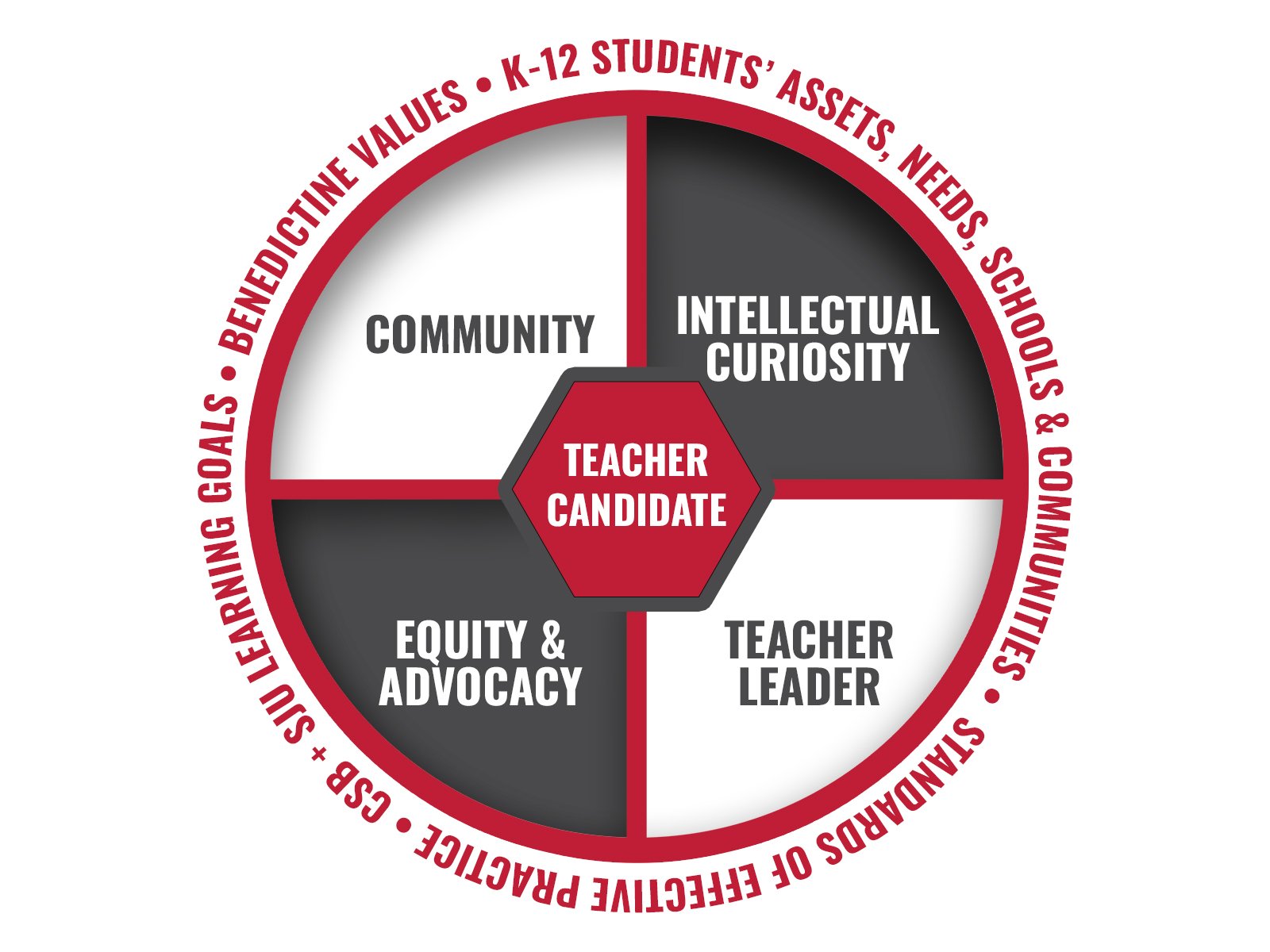 Home
Home
Learning Outcomes
Conceptual Framework

At the heart of the College of Saint Benedict and Saint John’s University Education Department lies a commitment to teacher candidates and excellence in teacher preparation. Guided by values deeply rooted in both tradition and innovation, we emphasize four interwoven principles: community, intellectual curiosity, equity and advocacy, and teacher leadership. These principles are derived from the Standards of Effective Practice, CSB + SJU learning goals, the unique assets and needs of K-12 students, and the Benedictine values. Together, they form the backbone of a comprehensive approach to teacher preparation that cultivates educators who are deeply invested in building inclusive communities, driven by a passion for lifelong learning, dedicated to advocating for equitable educational opportunities, and equipped to become influential teacher leaders. This holistic framework contributes to the development of teachers who are compassionate, curious, community-oriented, and poised to lead for positive change in the field of education.
Principle 1: Community
The CSB + SJU Education Department strives to create and sustain an authentic and inclusive community in which future teachers examine, reflect, and grow into their unique professional identities as dedicated educators committed to student success. Grounded in Benedictine values, our community is built upon caring interdependence (Calderwood, 2003), belonging and relatedness (Block, 2018), and “the sustained pursuit of a shared enterprise” (Wenger, 1998, p. 45) of equitable, research-based, student-driven learning. As a core element of our teacher preparation program, we strive to develop the knowledge, skills, and dispositions our future teachers will need to fully participate as educators in the many communities to which they will belong. Future teachers learn and practice evidence-based strategies to establish and create flourishing communities of learning in their classrooms. They have authentic experiences in schools in local communities that allow them to practice bringing community assets into their pedagogical practices.
Principle 2: Intellectual Curiosity
Our program is dedicated to fostering curiosity and intellectual integrity in candidates. With a strong foundation in the liberal arts, interdisciplinary study, and a standards-based education curriculum, our candidates are prepared to apply multiple lenses when responding to the dynamic world of K-12 education. Emphasizing the pivotal role of inquiry, students actively engage in questioning, investigating, and reflection during problem solving endeavors. Guided by a spirit of intellectual curiosity, candidates are not only prepared to draw on deep knowledge but also to design enriching educational experiences that cultivate dispositions for thoughtful analysis among K-12 learners. Ultimately, the goal is to develop future teachers who inspire students to become critical thinkers and engaged citizens, fostering a lifelong love of learning and inquiry.
Principle 3: Equity and Advocacy
Aligned with the CSB + SJU commitment to diversity, equity, inclusion, and justice, the Education Department strives to prepare teacher candidates who value equity and advocate for social change. As anti-bias educators, candidates undergo critical self-reflection of biases and stereotypes, carefully crafting curricular materials and enacting lessons that embrace inclusivity. Informed by critical multicultural education, culturally relevant teaching (Ladson-Billings, 2006), and equity literacy (Gorski & Swalwell, 2015), our vision extends beyond the classroom. We support candidates’ development into equity-literate educators, fostering an environment that recognizes, responds to, and redresses biases and inequities, ultimately preparing teachers to transform institutional policies and practices (Gorski, 2006).
Principle 4: Teacher Leaders
We are committed to nurturing the professional qualities that characterize effective teacher leaders. Central to our conceptualization are preservice educators dedicated to the growth and education of all K-12 students (Teacher Leadership Exploratory Consortium, 2011.) The roles and responsibilities of teacher leaders are explored across courses, cultivating a collaborative mindset through peer planning and teaching (Ado, 2016). We also prepare candidates to adeptly utilize research-based practices, assessment data, and knowledge of students’ cultures, languages, and backgrounds when developing curriculum materials that promote meaningful student learning (Teacher Leadership Exploratory Consortium, 2011). Ultimately, we seek to instill in our candidates a commitment to continuous learning and critical reflection. We encourage them to question normative practices, explore innovative teaching methods, and advocate for educational equity.
Licensing Standards
Our programs are designed to prepare teacher candidates to meet the Minnesota Standards of Effective Practice and the subject-specific content standards.
Evidence-Based Literacy Instruction
Future teachers at CSB+SJU learn evidence-based literacy instructional practices consistent with the science of reading. Literacy methods coursework focuses on the National Reading Panel 5 pillars of reading (phonemic awareness, phonics, fluency, vocabulary, and comprehension), as well as oral language, writing, and motivation. They are taught the importance of and how to implement explicit, systematic, and sequential phonics instruction. Future teachers are prepared to work with students with dyslexia and other disabilities that affect reading. The coursework covers symptoms of dyslexia, resources for students with dyslexia, and appropriate instructional strategies and interventions for students with dyslexia.
College of Saint Benedict
Saint John’s University
Leah VanOverbeke
Department Coordinator
CSB HAB 125
320-363-5709